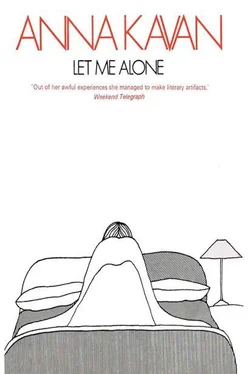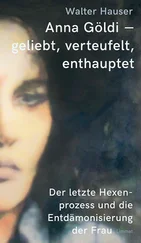‘I followed your carriage. After a time my driver lost sight of you, so I got out and wandered about.’
Anna was astonished. Or rather, she felt that she ought to be astonished. Actually, his appearance seemed natural, almost inevitable: rather providential, too, really. She found that she was glad of his support.
They began to walk along. The dark faces were still ceaselessly passing, and hemming them in, and staring with a strange, sneering, slightly obscene curiosity, in the flary dark. Findlay seemed unaware. But Anna felt herself violated. She couldn’t get rid of the feeling of violation, of having her privacy exposed and desecrated. She wanted to get away from all the dark faces — never to see them again — never while she lived.
‘Can’t we go somewhere quiet?’ she said. ‘Away from all these creatures? I want to be quiet.’
They turned off down a dark alley beside an immensely high wall. Massive and black the wall loomed in the darkness, steeply solid as a mountain-side, and black as the abysmal heart of night. An iron gate stood ajar. They pushed through. Inside was a queer, dark, level place with a few trees blackly entangled in the starry sky, and a mysterious distant glitter of black water. Black, nameless piles were towering here and there, incomprehensible and vaguely menacing like unknown presences. It was very dark, quiet, and deserted.
All this time, Findlay stayed silent, uninquiring. It was not till he had lighted cigarettes for Anna and for himself that he began to speak.
‘What happened to you?’ he asked, and his sleeve touched her wrist.
Anna strolled on with her cigarette in her mouth, abstracted. He kept in step with her, watching her with side-long glances in the dark. But there was a great gulf between them.
‘Where did you get to?’
‘Matthew took me to some horrible place,’ she said.
He peered closely.
‘How — horrible?’ he said, watching her.
She lifted her shoulders in an odd motion, half shrug, half shudder.
‘Oh — beastly. Don’t let’s talk about it.’ And she walked on more quickly, puffing her cigarette.
Findlay watched her with invisible eyes. His eyes were darkened shadows in the pale gleam of his face. She could not see them. But his smile, the beginning of his luminous smile, was visible to her.
‘Why are you going to the East?’ he said. ‘Why are you going to live with Matthew?’
‘Why?’ she repeated, in astonishment. ‘I’m married to him — that’s why.’ There was some bitterness in her tone.
He shook his head in the darkness.
‘It won’t do, you know,’ he said. ‘You’ll never be able to live with him, with Matthew.’
She felt a tremor go through her blood at the sound of Findlay’s mischievous, soft voice. There was something about him that was like magic to her, the swift, secret, unbelievable excitement that trembled in all her veins, because he was so thrilling, and she was so aware. She seemed so subtly attuned to his thrillingness. The consciousness of it vibrated through her with almost unbearable intensity. Yet her mind stayed quite aloof. Her mind was not attracted: it was even a little antagonistic. With her mind she recognized something shifty and elvishly unreliable in him, something which made it impossible to depend on him. And this she found unsympathetic.
‘Why won’t it do? Why shouldn’t Matthew and I live together?’
Once more she saw the negatory movement of his head. His face wore the curious smile, pale, disturbing, poignant, with the satyr-quality of dangerous archness.
‘It’s ridiculous. You’ll be unhappy. You’ll hate the life in the East. Why are you going there?’
Anna stood still and tipped the ash from her cigarette.
‘I must go. I must,’ she said. ‘There’s no alternative.’
‘You’ll hate it.’
She looked at him angrily.
‘Why do you say that? Why should you deliberately try to make me depressed? Do you want me to be miserable?’
‘Yes, perhaps.’ He gave a curious Mephistophelean laugh, almost soundless. ‘Perhaps that’s what I do want.’
She was resentful, staring at him accusingly.
‘Why? Why?’ she asked resentfully, challenging him.
He smiled, his wide, subtle smile, like a satyr’s, but so strangely attractive. It made a quiver like electricity pass through her. Yet her mind was antagonized, nor would it ever be otherwise.
So there was a sort of deadlock. She was tremulous before his smiling face. She thrilled at the careless, graceful poise of his long, thin body, so like an elegant, long-legged bird. She wanted him to come near. And he wanted to approach. But her mind had ultimately decided against him, rejecting him. And this held him off. He was too sensitive a plant not to wilt and shrivel in the blast of her silent criticism. He could not stand up against that. And she couldn’t help finding fault with him, in her mind. He was so irresponsible, like a child; and like a child, charming and heart-breaking. Perhaps if he were to touch her, her resistance would break down. Would he touch her? She shuddered, and hoped not. Or did she really, underneath everything, hope that he would? Anyhow, he did not.
And suddenly, as she watched him, she saw some men in uniform, with lanterns, coming along. As they caught sight of Anna and Findlay, as they drew near across the dark, empty space, there arose a certain commotion. Some of them shouted. Some were calling incomprehensibly, some were running towards them, some were gesticulating; it was like a kind of attack. Anna watched the approaching troop with apprehension.
And as she watched, in a moment the foremost men were upon them, talking loudly and excitedly. Findlay answered laboriously. It seemed that he knew a few words of Arabic. Anna looked on, rather nervous. The men were all round, standing quite near; such an odd, theatrical crew. But they didn’t do anything violent. In spite of their excitement they seemed quite deferential. So her alarms subsided, and she listened to the palaver. Findlay was standing beside her. She would have liked to stick a pin in his smoothly swelling, handsome, birdlike chest. She felt intolerant of him. He stood there, speaking slowly, his nose arched in his faintly conceited, aristocratic manner, as he talked to the men. His face had the palely-smiling gleam, his eyes in the lantern light flickered roguish and attractive. But somehow, mentally, she rather distrusted him. He was unsatisfactory: though he had that peculiar demonish distinction that thrilled her so much. She was sure he would let her down if he had the chance. If he had not already done so.
An understanding had at last been reached with the men. Findlay suddenly laughed and threw his cigarette on the ground. He stamped it out with the heel of his shoe.
‘We mustn’t smoke here,’ he told Anna. ‘It seems we’re in the government petrol depot.’ His face was all curling up in pale, faunal amusement.
But her heart had hardened against him. She put out her cigarette and moved away.
‘We must find Matthew and get back to the boat,’ she said coolly.
There was a dreariness in her on Findlay’s account. As though in rejecting him, or being let down by him, she had suffered some dragging internal wrench.
Without more ado they went back to the frequented, the Europeanized, tourist-ridden part of the town. Matthew was discovered outside the hotel, walking up and down in suppressed anxiety, and of course looking in the wrong direction. What to say to him? Anna could not bring herself to believe in his latest enormity, nor disbelieve. They called out to attract his attention.
He turned round. ‘Where have you been?’ he said, in an aggrieved fashion. ‘I’ve hunted for you everywhere. Everywhere.’ So he stared out of his blue eyes at Anna, and seemed to have forgotten the rest of the evening.
Читать дальше












